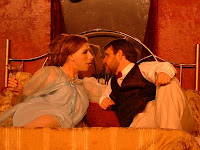 Once again- just like in "Relations Unknown" when Chris says goodbye to his friends-I find myself at the Whole World Theatre's Third Space, fighting back tears. It's the way Topher Payne as the transvestite prostitute Virgin Mary looks at his imaginary reflection in a cathouse mirror. I can't tell you why it bust me up inside or how he does it. It's the magic of theatre. It is also some kind of magic that keeps playwright Marki Shalloe's characters from being stereotypes, even though she gives us characters like the Voodoo Queen of New Orleans (Barbara Washington as Madame).
Once again- just like in "Relations Unknown" when Chris says goodbye to his friends-I find myself at the Whole World Theatre's Third Space, fighting back tears. It's the way Topher Payne as the transvestite prostitute Virgin Mary looks at his imaginary reflection in a cathouse mirror. I can't tell you why it bust me up inside or how he does it. It's the magic of theatre. It is also some kind of magic that keeps playwright Marki Shalloe's characters from being stereotypes, even though she gives us characters like the Voodoo Queen of New Orleans (Barbara Washington as Madame). If Madame were a Tarot card, she would be the Queen of Coins. She reads the cards to find a missing negligee, conjures a spell to find lost money and asserts her dominion over her famous house of ill repute like Cajun royalty. Ms. Washington wears the role as naturally as she does her flowing caftans and her Creole accent is flawless.The Two-Faced Do-Gooder (Barbara Cole as Persephone) is also potentially a stock character, but Ms. Cole turns it into a continual unveiling of the beige persona she wears like her beige costume.
Gradually we learn the truth behind her concealed charms, her hidden intentions and her easy seduction by the gin that flows like water.We've all seen Wisecracking Hooker with the Heart of Gold before, and Virgin Mary is no exception."You're more screwed up than the whore next door," she says to Persephone, "and she hits men with a riding crop for $20."
Payne, however, transforms himself into a woman deploying wit like a weapon against the stings of the world's cruelty. As a man, he uses the world's own prejudice against it to fool the police and protect his savior.
Ms. Shalloe also gives us the Lecherous Musician. Once again (see "Urinetown"), I am glad to see the leading man killed off. This is not a spoiler alert: the show closed March 25 and you have my abject apologies for not getting to it sooner. However, DeWayne Morgan as the decadent harmonica player, brothel customer and drug pusher stands out as a symbol of evil even as the women around him break the law on a daily basis.
They break taboos, too, using a two-way mirror to spy on each other. Director Betty Hart guides the production, lit with subtlety and naturalness by Nina Gooch on a lush set designed by actor Payne, until the audience feels like it, too, is spying on the occupants of Babylon.
There's one more break that cannot go unnoticed, like an 800-pound gorilla in the room. When a leading lady breaks her leg, custom demands that the understudy fill in. Yet Ms. Cole walks the stage in a prescription boot to which no character, even the immensely curious Virgin Mary, refers. Maybe like Ms. Shalloe, Ms. Hart has also refused to give in to stereotype.







